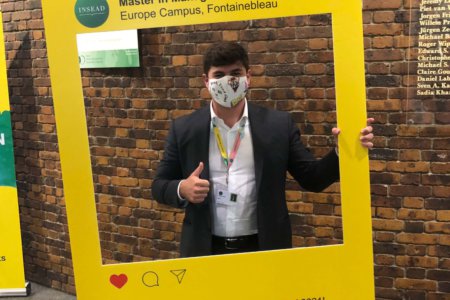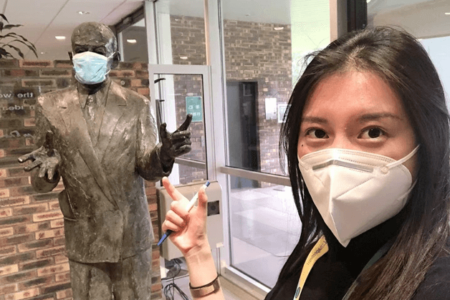
With the abundance of water on our planet, many might assume that water scarcity shouldn’t be an issue plaguing modern society. Still, this is far from the case. Only 3% of the world’s water is freshwater — with a shocking two-thirds of that taking the form of frozen glaciers or being otherwise unable for human use.
Because of this, over 1.1 billion people worldwide lack access to water, and some 2.4 billion face inadequate sanitation, making them prone to water-borne illnesses such as cholera and typhoid fever. Two million people die from diarrheal diseases as a result, with most of them being children.
Stanley Samuel knew he wanted to dedicate his life to addressing the issue of water scarcity from a young age. When he was living in his hometown of Jabalpur, India, he remembers witnessing rivers run dry during summer months, lakes shrink and gradually disappear, ancient man-made water reservoirs become landfills and then reclaimed for commercial purposes. He knew he wanted to start up an enterprise that would play a part in helping address this.
Similarly, Marcus Lim came to experience the vast inequality in wealth, access to social services and economic opportunities in the world through various roles in his 16-year stint in management consulting. Through this, he became determined to leverage his corporate experience to channel technology, capital and talent to where they are most needed in financially sustainable ways.

Lim and Samuel at INSEAD in 2012, where they crafted the ECOSOFTT business model. Source: Marcus Lim and Stanley Samuel
Lim and Samuel met whilst studying at INSEAD, where they were both completing their Executive MBAs. There, they realised their mutual passion and decided to work together to form ECOSOFTT, a global pioneer in the field of decentralised management of water, wastewater and environmental services.
Since then, ECOSOFTT’s water and wastewater technologies and solutions have been employed in over 70 projects that serve over 300,000 people, and uplifted over 5,000 underprivileged individuals. It’s this among others that have won them INSEAD’s Business as a Force for Good Award in 2019, where they were recognised for making a meaningful societal impact.
We speak to Lim and Samuel about their journey in addressing the pressing issue of water scarcity and sustainability, and their overall experience in realising their dreams as former students of INSEAD.
What challenges did you face in bringing your project to life?
Prior to starting ECOSOFTT, neither one of us had any direct experience in the water and social enterprise sectors. We had limited knowledge of the industry and relevant network, not to mention the engineering expertise. But we were not afraid to learn even though we were well into the middle of our careers.
What impact has your company made on addressing the issue of water scarcity in surrounding communities?
To date, ECOSOFTT’s water and wastewater technologies and solutions have been employed in over 70 projects that serve over 300,000 people who now gain access to water sustainability.
Through our Solutions for Underprivileged Programme, we have uplifted over 5,000 persons living at the Bottom of the Pyramid. They now gain 24×7 access to Clean Water, dedicated Sanitation facilities, Wastewater Recovery systems and improved Livelihood.
Why is “Business as a Force for Good” important to you?
Businesses are among the most sophisticated institutions in the world with vast resources. However, most businesses have traditionally defined their primary goal as shareholder value creation.
We started ECOSOFTT with a fundamental belief that businesses must be highly engaged to address societal and environmental issues. In other words, businesses have to shift from shareholder value creation to stakeholder value creation.
Business schools have a major role to play if we are to achieve that goal. Hence, we are delighted that INSEAD is championing Business as a Force for Good to change the traditional management paradigm.

Lim and Samuel won the Business Model Competition in the Social Entrepreneurship Class for their efforts. Source: Marcus Lim and Stanley Samuel
How has your education at INSEAD helped you bring your project to life?
ECOSOFTT’s business model was conceptualised when we were studying in INSEAD, when we both completed our master’s theses on the topics of water and social entrepreneurship. Our combined passion for sustainable water management and transformational social entrepreneurship formed the ideals that are embedded in ECOSOFTT’s founding principles.
One of the memorable moments was attending a course on Social Entrepreneurship in 2012. As part of the course, we are tasked with coming out with a business model for a new social enterprise. That was our first try at testing out the acceptance of our idea. It was raw, but contained all the key elements of the business model that we still apply today. We won the first prize. You can say that was the first recognition of the potential of ECOSOFTT by INSEAD.
On top of the educational content, the network and resources provided by INSEAD helped to launch the enterprise.
Many of our initial investors were INSEAD alumni and faculty who share the same beliefs. They have been a pillar of support throughout the journey. In addition to funds, many of them contribute their expertise and network.
Moving forward, where would you hope to be in the next five to 10 years, and do you have any advice for aspiring entrepreneurs?
With the urgent climate and water crisis, there is a lot left to be done by ECOSOFTT along with many other organisations.
The is much that we can do to expand our geographical presence, especially in Southeast Asia and the Middle East. Another key thrust is technology innovation. There are many opportunities for circular management of water, energy, materials and nutrients to bring out greater sustainability and impact.
The need is much larger than what one organisation can meet. We aim to inspire young and mid-career professionals to redirect their talent for a great purpose. Eventually, we hope to pay forward by investing time and money in the next generation of social entrepreneurs in related fields, including setting up a fund/investment platform for sustainable projects and social enterprises.










